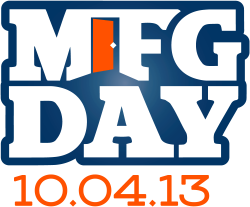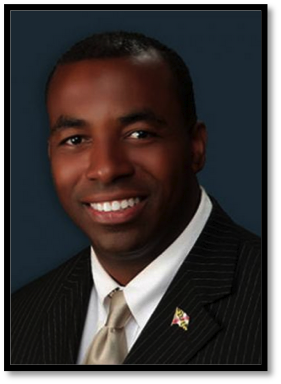October 5, 2013, Towson, MD – More than 150 Maryland manufacturing stakeholders came together on Friday at the Towson Sheraton to hear the views from both Democratic and Republican Gubernatorial candidates on how they might improve manufacturing in Maryland if they were elected.
 |
[utubevideo id=”1″] |
In a discussion fueled by a Ball State University study on the health of manufacturing across the 50 states, RMI invited the current gubernatorial candidates (as well as the study’s author) to a frank discussion about the state of Maryland manufacturing (which received a D in the study). The dialogue was spirited, intense and direct, and it gave all participants opportunities to express their positions. The author of the study, Dr. Michael Hicks, was featured as the opening keynote, and then each candidate had a turn to respond to the study and outline their own platforms for manufacturing (See Baltimore Sun coverage here | Washington Post coverage here | BBJ coverage here).
This was the first joint appearance to discuss precise solutions for manufacturing.
“Every one of the attendees were moved by the bipartisan embrace of manufacturing; however, the proposed techniques were very different,” noted Drew Greenblatt, President of Marlin Steel Wire Products and Chairman of RMI. “They all had very different approaches on tax rates, regulations, education, and natural gas production.”
Susan Ganz, President of Lions Brothers, was one of the RMI panelists who asked candidates follow-up questions after their presentations. She noted: “Five candidates for Governor, (Lt. Governor declined the invitation due to a scheduling conflict- His office has requested a future meeting with members of RMI, which we have agreed to do.) Democrat and Republican, sharing one stage, each discussing ideas to ensure a future for manufacturing in Maryland. What a worthwhile conversation and event!”
“Once again, the RMI has risen to the occasion,” said Neill Christopher, Director of Manufacturing for Acadia Windows and Doors. “There was no politics, no finger-pointing, and no partisanship just real issues and real solutions provided by both the candidates and panel of moderators.”
“While we often can hear a candidate speak, this was the first chance I had to see and hear them speak on something this focused and important, not just to me, but to our future generations’ manufacturing,” said Bill Tiger, Plant Manager for GM Baltimore Operations. “Thanks Mike Galiazzo, thanks RMI, and thank you to all the gubernatorial candidates who participated in Manufacturing Day!”
RMI’s goal was to get manufacturing on the gubernatorial agenda.
“We put manufacturing on the agenda for the 2014 race for governor,” said RMI President Mike Galiazzo. “On Friday, we heard some very specific recommendations from the candidates. Now we want some concrete actions taken so that we can move people from poverty to prosperity by increasing Maryland middle class jobs. This was a great start. We will keep engaged with the candidates to help their constituents understand the candidate positions.”
On Friday (October 4, 2013), Governor O’Malley issued a proclamation declaring October “Maryland Manufacturing Month “and kicked off a year-long focus on the state’s manufacturing industry: Advancing Our Cause for Manufacturing.
FOR EVEN MORE COVERAGE, READ “Manufacturing jobs become an issue, long overdue, in Maryland governors’ race” – Marlin Rising (Marlin Steel Wire Products Blog)
The Candidate’s Plan for Improving Maryland’s Manufacturing Climate
Presented at RMI’s MFG DAY EVENT – October 4, 2013
Douglas Gansler
- Reduce Corporate Tax: 8.25% – 6% to make it competitive with neighboring states
- Promote MD Unique Strengths: life sciences and cyber-security
- Revamp Procurement Process: buy Maryland
- Create Industrial Business Zones: capitalize on existing manufacturing footprints by preserving zoning, and within zone providing workforce training, tax credits if use vacant properties, and efficiency grants
- Maryland Life Cycle Manufacturing Credits: support MD business development by extending R&D tax credit to manufacturing of those products in MD
- Green and Renewable Energy Tax Credit: incentives to renovate vacant industrial buildings to manufacture components for qualified renewable energy systems
- Small Business Manufacturing Grant Initiative
- Governor’s Business Council: assistance to new corporations coming to MD
Ron George
1. Regional approach
— a. Western MD: cultivate natural resources (natural gas)
— b. Baltimore: enhance education; lower property tax rate
— c. Eastern Shore: Encourage small start-up companies
2. Expand use of Baltimore Harbor (logistically)
3. Lower income tax rate to FY14 -6.25% — FY15 – 5.75%
4. Cut personal income tax rate to 5%
5. Educate all workforce
6. Consolidate all state resources in one agency to encourage international commerce
7. Maintain lowering of state debt
8. Grants for responsible energy companies manufacturing in MD
Heather Mizeur
- Streamline State regulations to improve the regulatory environment for business (ex: brought industrial composting into State)
- Expand research commercialization and utilize cluster approaches throughout the State: cyber-security, health sciences, green economy
- Use commercialization to create market based niche industries (ex: State already set up to take advantage of Nanotechnology industry
- Align market based job opportunities with curriculum in secondary schools (ex: expand vocational opportunities for high school students)
- Improve and invest in early childhood education; address needs of children ages 0-5 in comprehensive manner to create the skilled workforce of tomorrow
Charles Lollar
1. Implement his MARYLAND MADE, MARYLANDERS PAID initiative that grows Maryland’s manufacturing economy, creates jobs and improves the state’s business climate and competitiveness.
2. Review and reform the 74 tax/regulations alongside industry focused advisory board and the DBED.
3. Implement energy policies that promote competition and consumer choice. Promote development of coal and natural gas for in-state and export, and competitive reality-based private sector innovations for resources such as solar and wind.
4. Review and improve boards that impact Maryland’s economy.
5. Reduce personal and corporate state income taxes to 5% with a strategy that promotes economic growth.
6. Develop effective educational partnerships through internships/business clubs with manufacturing companies and secondary/trade schools.
7. Promote school choice to provide quality education to all students and tax benefits to parents.
David Craig
- Reduce all taxes: income, corporate income, inheritance, impact fees, worker’s compensation fees to create better economic base to improve long run environment
- Reduce energy costs: move forward on natural gas/energy issue
- Examine regulatory process in MD; remove/modify particular processes
- Education: increase apprenticeship programs and training programs; career oriented versus higher education
- Strong partnership with DBED to create capable team





